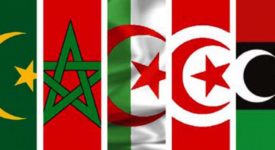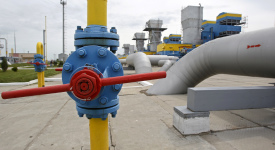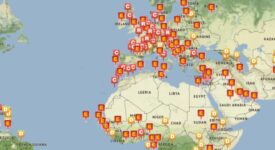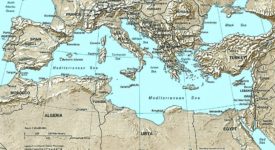Algerian army’s hard line tactics against thousands of people, claiming to be treated as citizens, risks destroying its historic legitimacy. The senior army commands have hijacked the judicial system, forcing the police to harass without mercy thousands of NGOs and civil society activists and often take them to court, alleging they are destroying national unity. The generals might succeed in imposing presidential elections in December but they will not help stabilize the country. Nor will it allow trust to return.
For nine months now, hundreds of thousands, sometimes millions of Algerians have been taking to the streets of towns and villages on Friday each week in Africa’s largest country. Nine months later, the standoff between the Hirak (the people) and the senior army high command is complete. The latter is organizing presidential elections next month that will be viewed as politically illegitimate by millions of Algerians even if they are legal in a narrow sense and endorsed without conviction by France and the EU which are trying to grasp the meaning of a massive popular revolt they did not see coming.
Meanwhile the senior army command has hijacked the judicial system, forcing the police to harass without mercy thousands of NGOs and civil society activists and often take them to court, alleging they are destroying national unity. The sheer autism of the army, all of whose leaders are over 70 years of age, risks pushing a movement which has shown considerable forbearance to date and refused violence over the edge, which would destroy not just the unity of Algeria but the army’s cherished claim of historical legitimacy.
Some foreigner observers are prone to equate being Muslim with obscurantism, violence and with an anthropological incapacity to appreciate the benefits of democracy. Much of the western media serves up a diet of “eradicating” violent Islamic groups and paints one of the world’s great religions in the dark shades of an El Greco painting. As the historian James McDougall explains, they continue to see Algeria through “antiquated stereotypes of piracy”, the country’s seven years of ‘savage’ colonial war or the “more recent terrors of Islamist and state violence since 1992”. Algeria, through such lenses, cannot be understood other than in terms of upheaval, rupture, violence, and trauma.
But what we have been witnessing since last winter is the “sometimes ferocious strength of a succession of states, and their simultaneous fragility and limitations.” Algeria was described by General de Gaulle as anarchic, a “poussière d’hommes”. What he failed to appreciate was the extraordinary resilient nature of Algerian society. Current events, writes Mc Dougall, cannot be understood “by measurements against prescriptive (and in fact mythical) schemes of ‘national awakening’, developmental modernization, ‘Western-style free-market democracy’ or the ‘Islamic republic’ but in terms of the constant interplay of social forces with the institutions of state, in which the former have often been more robust, the latter less coherent, than has frequently been appreciated”.
Hence the need to guard against an approach which favors high politics and palace intrigue to the detriment of the vast social forces unleashed by the Hirak – the popular movement. A key feature of this popular rebellion – some would call it a revolution, has been its refusal to resort to violence despite growing state repression since last summer. The appointment of remarkably incompetent people, the fact that ministers with important portfolios appear to report to the Secretary General of the Ministry of Defense rather than the Prime Minister who has taken on the role of a puppet, the fact that the Chief of Staff and de facto ruler, 84 year old General Ahmed Gaid Salah makes appointments to senior jobs across ministries and state companies, thus violating the very rules of these bodies, all this is of interest.
But it maybe that in the medium term Hirak’s refusal to use violence despite growing state repression is more important that these palace intrigues. Many Middle Eastern leaders are desperate to see the Hirak fail as its political savviness might inspire others in the region. The EU for its part has neither the courage nor the political will to remind Algerian leaders that freedom of expression, notably for the media, is vital for future cooperation. History is in the making and Europe shines by its absence.
The senior army command and those in charge of the security services have tried their best to provoke and oppose Berbers versus Arabic speaking, secular versus Islamist, east versus west. The time-honored methods of divide (and intoxicate) and rule no longer work. The Amazigh (Berber) flag, for long a symbol of Kabyle Berbers versus the rest, is now borne by demonstrators wrapped in the national flag; those who carry it in Kabylia are not arrested but elsewhere in Algeria they often are as if the high command were saying, “you are allowed to play the monkey in your corner of the zoo but not elsewhere”.
The fear of radical Islamist parties has often been used by Algerian and other rulers in Middle Eastern countries, to scare domestic opinion and Western governments: better allow authoritarian rulers than the dreaded Islamists. That no longer works. Islamist parties are here to stay and, as in Morocco and Tunisia, they are finding their place in the political party jigsaw puzzle. Women wearing the veil demonstrate with their sisters – the demonstrations have seen the emergence of a new Algerian – people who no longer have a chip on their shoulder about the former colonizer, who often speak English and who dream of the world.
Like in neighboring Tunisia they want to reign in corruption and have a say in shaping the future of their country. The generals might succeed in imposing presidential elections in December, having failed to do so twice last spring and summer. But if they anoint candidates beforehand as the Supreme Guide does in Iran and if they fail to revise the electoral roll or stuffs the ballots boxes, their victory will ring hollow and will not help stabilize the country. Nor will it allow trust to return, neither trust between Algerians nor trust among foreigners which is necessary for foreign investment. Capital will continue to flee the country, as will educated talent.
Arresting dozens of company CEO’s as well as leading members of Bouteflika’s clan last spring was akin to throwing red meat to the crowds. Algerians however have not bought the narrative of the senior generals fighting corruption for several reasons. Firstly, because many of them are as corrupt as the CEO’s they have put behind bars; secondly, because the due process of law is being trampled on; thirdly, because Algeria’s possibly richest entrepreneur Issad Rebrab is feared because he has the means to finance electoral campaigns which would inevitably loosen the high command’s vice like grip on power. The due process of law does not apply to those closest to Bouteflika like his brother Said or former prime minister Ahmed Ouyahia, who dismantled parts of state industries whilst convicting public servants of integrity for “corruption” as part of a policy of privatization that was endorsed by the World Bank and the IMF.
The close ties Bouteflika wove between many of the senior military and security forces, crony entrepreneurs and key allies have left Algeria bereft of functioning institutions. Conflicts within this nebulous group have drawn in foreign interests, robbed Algeria of tens of billions of dollars and hollowed out the country’s respected government and state-funded institutions. General Gaid Salah, an officer by many seen as incompetent, was promoted by Bouteflika to whom he played the role of a useful pawn.
With energy exports accounting for 95% of Algeria’s foreign exchange earnings, this vital sector was till 2011 entrusted to long-time Energy Minister Chakib Khelil who managed the state energy company Sonatrach as a personal fiefdom, introducing unimaginable levels of corruption. This company, which employs over 100,000 and is one of the largest in Africa, was entrusted to Abdelmoumen Ould Kaddour who had already been condemned by Algerian justice for intelligence with a foreign power, when he headed Brown & Root-Condor, a subsidiary of Halliburton, the oil services company founded by former American Vice President Dick Cheney.
What sort of message was the former president sending to Algeria’s foreign partners in the process? Since 1999, this key sector of the Algerian economy has fallen from Charybdis to Scylla. Today it is directed by its managers, often appointed by default but on an auto pilot system, which is simply not tenable. As successive governments dare not cut subsidies on domestic prices, as domestic use of oil and gas increases fast, and production stagnates what is Algeria’s hydrocarbons future? Reserves are plentiful but unless trust in government and in the energy sector are restored and until new exploration contracts are signed with foreign partners, uncertainty will continue to hover over the sector.
Algeria is between a rock and a hard place. The Hirak will not go away even if Gaid Salah succeeds in holding the presidential election on 12 December. Foreign partners of Algeria, not least Russia, France, the US, the EU and the Gulf States might even give it their blessing. A president elected in such circumstances would have no mandate to carry out reforms; however polite foreign powers reacted, they would also be only too aware of the fragility of an apparently ferocious state.
Foreign companies, not least in the hydrocarbons sector would understand that and any new law on hydrocarbons, if not explained to ordinary Algerians, would not last very long. With around $60bn in hard currency reserves, Algerian leaders can sit tight for six months, but what happens after that if the price of oil does not rise is anybody’s guess. The price of gas is lower than it has been for years: the much lauded EU security of supply has morphed into a security of offer – in other words producers are finding it harder to sell their gas, and at lower prices than for years. Never has the need for a strategic debate on Algeria’s economic, let alone regional future, been greater.
Comparing Algeria with neighboring countries is fraught with difficulty but it is worth remembering that the first ever-Arab Spring occurred in Algeria in 1988-1991. Had it not been for the monumental incompetence of the government led by Sid Ahmed Ghozali in the run up to the election of December 1991, Algeria could have postponed the elections and carried on with economic reforms, thus sparing the country years of a bloody civil war. Despite the increasing repression of recent weeks, the army seems to have understood that bloodshed is best avoided but Africa’s largest country cannot be run on autopilot forever. Meanwhile, millions of Algerians want to build a modern state – sixty years after they acquired their territorial independence. The Algerian military has locked itself into a narrow reading of the constitution, offering no long-term solution to the crisis while its historical legitimacy is slowly but surely crumbling.
‘Algeria is Caught Between a Rock and a Hard Place’ – Opinion by Francis Ghilès – Barcelona Centre for International Affairs / CIDOB.







